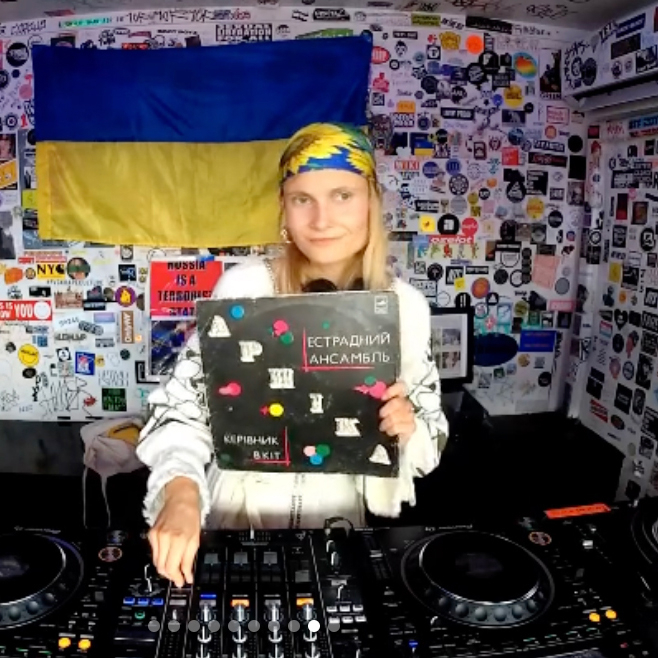“It all changed on February 24,” says Daria Kolomiec. She recalls the day, nearly three years ago, when Russia invaded her home city of Kyiv, Ukraine. “I was one of those people who didn’t keep my phone near my bed,” says the 36-year-old musician and activist. But that morning “I felt the vibration of my phone from the other room. I didn’t even open my eyes, but I understood that it had started.”
Before the invasion, Kolomiec had been a successful D.J., even founding the streaming app MusiCures at the height of the pandemic and using it to broadcast music and podcast episodes to a global audience. Just days into the siege, hiding in the basement of a local coffee shop with nearly 50 other people, Kolomiec began crafting ways to use her platform to support her country.

For Kolomiec, like many of her fellow Ukrainians, Russia’s attack, rather than marking the start of a new conflict, was just the next chapter in a long and bloody story. Her great-grandmother Kateryna was a teenager in 1932 when Ukraine’s famine, known as the Holodomor (a combination of the Ukrainian words for “starvation” and “to inflict death”) began under Joseph Stalin’s ruthless regime. Kateryna’s mother was later killed for hiding a piece of bread to feed her children.
Kolomiec was born in Cherkasy, Ukraine, in 1988, three years before the fall of the Soviet Union and the establishment of Ukraine as an independent nation state. She was 16 and in her final year of high school during the eruption of the Orange Revolution—mass protests against fraud and voter interference in the Ukrainian presidential election. Kolomiec packed orange clothes and set off for Kyiv’s Independence Square to join the fight, marking the birth of her own political conscience.
But it wasn’t until 10 years later, after Russia’s annexation of Crimea sparked the Russo-Ukrainian War, that Kolomiec felt she was fully able to discern the insidiousness of Russia’s grasp on Ukraine. She’d been working as a host on the television station M1, which frequently presented Russian artists, “but after 2014, it was forbidden,” says Kolomiec. “I woke up and understood that all of this was just Russian propaganda.” She decided to take charge of her situation. “It’s time to grow up and educate myself,” she recalls thinking.

Kolomiec turned to music, D.J.-ing on Ukraine’s first online radio station, Aristocrats, from 2015 to the start of the coronavirus pandemic, when she founded MusiCures.
“I woke up and understood that all of this was just Russian propaganda.”
Four years later, cramped in that coffee-shop basement and clutching rare Ukrainian vinyls, she came to realize how MusiCures could once again unite Ukrainians. Struck by how differently the men and women around her all reacted in the face of war (some spoke often, while others were silent; some refused to eat, while several turned to liquor), she realized that answers to the question “How did the full-scale Russian invasion start for you?” would vary immensely. And what better way to broadcast the Ukrainian experience of the Russian invasion to the world than by interviewing the actual Ukrainians under attack?
Still living in a bunker, Kolomiec reached out to contacts who could help with production, swiftly launching the Diary of War podcast, where she interviewed everyone from artists to military volunteers. “The more these stories are heard, the more people not from Ukraine can understand what it’s like,” she says. “That’s why these diaries are so important.”

This was just the start of Kolomiec’s efforts to magnify Ukrainian voices. In June of 2022, she traveled to New York to D.J. sets of exclusively Ukrainian music at popular clubs, such as Le Bain, feeling the “need to tell the truth” through every platform possible. “Music is sometimes a more understandable language for people,” she says. “They were ready to listen to me. They were ready to support.”
Kolomiec is also working on adapting episodes of Diary of War into theater productions, hosting staged readings as a means to raise money for non-profits, volunteers, and other vital organizations back in Ukraine.
Still, the fight is far from over. “I know that we will not give up. We’re not tired. We’re angry sometimes, of course, because we’ve been killed—this is a genocide we’re living inside,” says Kolomiec. “We’re going to keep going. If we were tired, there would be no Ukraine. We’re still standing. After two and a half years, we’re standing.”
Jack Sullivan is an Associate Editor at AIR MAIL


